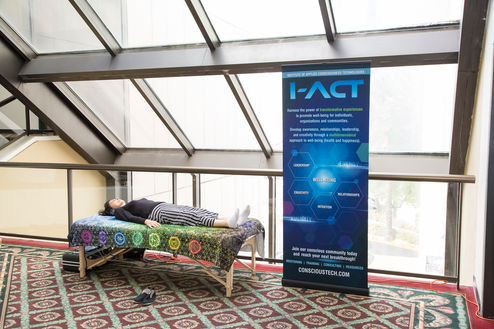Coaching
Organizational
Well-Being







I-ACT provides certificate programs through its community of leaders in consciousness science, education, management, creative industries and technology.
The first program is the 30 contact hour Level 1 Certificate on Organizational Well-Being: Leadership.
I-ACT's courses are be provided to leaders and entire organizations online, live at companies, and at company retreats in Portugal, California and beyond.
Practical immersions in specialized environments in both continents will lead to a Level 2 Certificate. Finally, participants will be able to demonstrate mastery of the principles, techniques and technologies available in applied consciousness to organizational well-being and leadership, through a capstone project. The project will be supported by I-ACT's Conscious Tech Hub linking the exciting startup scenes of California and Portugal.
Even the most effective leaders need a confidant, a sounding board, or a mentor to work through a personal or professional obstacle. With the creative and vital force of consciousness practices and technologies, I-ACT Evolutionary Mentoring can make all the difference. From the creative and innovation sectors to cognitive and physical performance, there is always a mental component that can be enhanced through advanced mindfulness practices or a different perspective to consider.
I-ACT's courses are be provided to leaders and entire organizations online, live at companies, and at company retreats in Portugal, California and beyond. However, the application of principles and methods of Organizational Well-Being to improve the performance and health of your team or community can require the support of a team of experts. I-ACT assists non-profit organizations, small and medium companies, large corporations, and community, government and policy leaders.
-
What is Conscious Leadership?
-
What is Organizational Well-Being?Well-being, put simply, is what most people desire: health and happiness. However, science shows humans are, generally, not so great at finding happiness. The largest study on well-being reveals that strong relationships and a sense of purpose are among the strongest correlates of happiness. Organizations can promote well-being by providing authentic relationships, healthy habits, a sense of purpose, sufficient autonomy and opportunities for development or mastery. We think that the world sorely lacks more leaders- in communities, in businesses, in the civic arena - that can promote well-being for more people. I-ACT Organizational Well-Being is a model rooted in the vital, intuitive, mindful, creative realm of consciousness and built around four core areas of focus: leadership, creativity, relations and intention. We offer courses, experiential immersions, certificate programs, individual guidance and organizational consulting. I-ACT leverages decades of research and mastery of spontaneous and intentional transformative experience to enable a more conscious leadership, creativity, leadership and intention. Together, we can shape leaders of tomorrow and further qualify today's leaders to enable more individuals to reach their potential and enrich and better the world in their unique way. I-ACT provides training for creative, community and business leaders focused on the Intentional, Creative, Leadership and Relational dimensions of Well-Being.
-
Why do people often suffer in organizations?"The human experience is irreducible: humans and their organizations emerge from the immaterial." - Paulo Vieira de Castro Is it possible to talk about well-being and ethics in organizations without asking why people suffer in organizations, in families, and in communities? This is a theme that has interested me for a long time. I have already written some books where this topic is discussed at length. How to address the widespread problem of low engagement or even bitterness and pain in the workplace? We can easily understand that those who make decisions in an organizational environment endure a high degree of suffering themselves. Lack of well-being in workplaces impedes satisfaction, happiness, motivation, productivity, resulting in stress, conflicts, anxiety, etc. Why does this occur? Now, it happens that inside and outside the companies, government, or families we are not only atoms. We are the result of our fixed ideas, of limiting beliefs, and of ancient values (or of their absence). It will, therefore, be fundamental to retain the idea that we are constructed from the immaterial. This is for ideas, relationships, psychological tensions, mental states, consciousness, spiritual insights, etc. On the other hand, the mind has become the focus of business activity, at the same time as well-being and related therapies are becoming commercialized. However, the real source of the crisis is this! The crisis is not economic or financial, it is the result of the struggle for the "control" of the minds human beings... Finally, empathy in professional relationships is lacking. Remember empathy is to suffer with... Starting with our values and applying energy, we can create synergy and rapport. A more conscious leadership can provide an alternative for the 21st century. - Paulo Vieira de Castro, I-ACT Organizational Well-Being, Director



